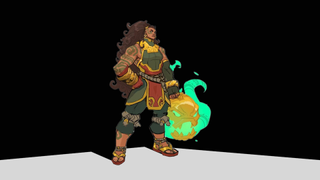Riot's League of Legends fighting game will of course be free-to-play
And Illoai joins the cast to whack things with a giant skull.

Riot's fighting game, codenamed Project L, has announced a new character alongside another in-progress look at the fighting game. Set in the League of Legends world of Runeterra, this is a two-on-two fighter where players control one fighter directly while using the other for assist attacks.
The big if unsurprising news today is that Project L will be free-to-play. Riot developer Tom Cannon, whose name makes him sound like he should be in the Justice League or something, shared a short video showing some concept and in-development work, as well as a few more snippets of in-game fighting footage.
About to head off to Vegas for Evo, but before I do... pic.twitter.com/bQ9QoSwvpKAugust 1, 2022
With regards to the business model and monetisation, Cannon says: "We operate with one approach: if we wouldn't like it, we won't do it." He goes on to say that Project L will "respect your time and your wallet."
As for the game itself, Riot had already made it clear it's not targeting 2022 for launch, but it sounds like 2023 may be when we can get our hands on this thing. "We're finishing up our core mechanics now, says Cannon. "And a lot of the team has moved on to building champions or to in-game features like competitive play and our social systems."
The principles of the game are that anyone should be able to play it, but the mention of competitive play is Riot once more telling the FGC community it's going to deliver the things the FGC community wants: primarily rollback netcode. Project L remains in development at the Riot-acquired Radiant Entertainment, and here's everything we know about it so far.
The biggest gaming news, reviews and hardware deals
Keep up to date with the most important stories and the best deals, as picked by the PC Gamer team.
Rich is a games journalist with 15 years' experience, beginning his career on Edge magazine before working for a wide range of outlets, including Ars Technica, Eurogamer, GamesRadar+, Gamespot, the Guardian, IGN, the New Statesman, Polygon, and Vice. He was the editor of Kotaku UK, the UK arm of Kotaku, for three years before joining PC Gamer. He is the author of a Brief History of Video Games, a full history of the medium, which the Midwest Book Review described as "[a] must-read for serious minded game historians and curious video game connoisseurs alike."
Most Popular







